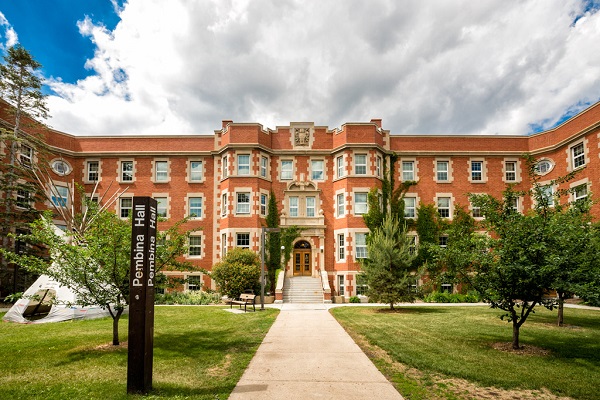University of Alberta: New Canada Research Chairs and New Frontiers in Research Fund Recipients
On January 12, 2022 the Government of Canada announced the results of the Canada Research Chairs (CRC) 2020-2 cycle, the New Frontiers in Research Fund (NFRF) 2020 Transformation Competition and the Tri-Agency Scholarships and Fellowships. Our community has cause for celebration as a number of University of Alberta researchers and projects have received funding. Congratulations to all of the recipients!
Todd Alexander, Faculty of Medicine & Dentistry
Dr. Alexander is a Pediatric Nephrologist at the Stollery Children’s Hospital and Professor of Pediatrics & Physiology at the UofA. He completed his BSc at Queen’s University and then his MD at the University of Western Ontario. Training in Pediatrics was performed at Memorial University in Newfoundland and Pediatric Nephrology at the Hospital for Sick Children, Toronto. After this, he received a Ph.D. in Cell Biology from the University of Toronto. He then completed a Post-doctoral fellowship in renal tubular physiology at St Radboud University, the Netherlands. Thereafter he was recruited to the University of Alberta as an Assistant Professor in 2008, with his wife and two daughters.
Dr. Alexander is the Canada Research Chair in epithelial transport physiology, processes that are abnormal in children with kidney disease. He meshes his research program that studies causes and consequences of pediatric kidney diseases with a clinical practice focusing on disorders of renal tubular transport, such as kidney stone formers. This work has produced more than 100 publications to date and is actively funded by CIHR, NSERC, and Stollery Children’s Hospital Foundation through the Women and Children’s Health Research Institute (WCHRI).
Dr. Alexander is heavily involved in research training, and currently leads the National Kidney Research Scientist Core Education and Training Program.
Dr. Alexander became a Stollery Science Lab Distinguished Researcher in 2018, and joined WCHRI leadership in 2020 as Associate Director.
Elaine Hyshka, School of Public Health
Elaine Hyshka is currently appointed as an Assistant Professor of Health Policy and Management in the University of Alberta’s School of Public Health. Her research spans both health services and systems and population health pillars and focuses on advancing a public health approach to substance use. Her program leverages my interdisciplinary background and diverse methodological experience to generate new knowledge that advances health systems innovation and improves health outcomes.
Prior to her faculty position, she completed a Doctor of Philosophy in Public Health Sciences and a studentship in health services and policy research (University of Alberta). Elaine also holds a Master of Arts in Sociology and Certificate in Addiction Studies (University of Toronto) and has previously worked in research and policy development for municipal and federal government and within the health system.
Her research and public health leadership have been recognized by several awards, including Harm Reduction International’s Brooklyn McNeil Rae of Hope Award (2017), a Policywise for Children and Families Early Career Transition Award (2017-2018), and an Alberta Health Services’ President’s Excellence Award for Outstanding Achievements in Innovation (2016), among others. Between May 2017 and November 2019, She was appointed Co-Chair of the provincial Minister of Health’s Opioid Emergency Response Commission. She currently serves as Vice Chair of the Institute Advisory Board for CIHR’s Institute of Population and Public Health.
Kim Tallbear, Faculty of Native Studies
Kim TallBear, author of Native American DNA: Tribal Belonging and the False Promise of Genetic Science (2013), is Professor in the Faculty of Native Studies, University of Alberta. As a returning Canada Research Chair in Indigenous Peoples, Technoscience, and Society, Dr.TallBear aims to reduce biases in science and technology research and shape policy to support Indigenous peoples’ cultural and political self-determination. Through new curricula, research partnerships, publications and activities like social media, radio programs and podcasts, she and her research team aim to inform national, global and Indigenous self-governance and reconciliation work related to science and technology. Indigenous peoples have made substantial contributions to science and technology throughout history. But there is still more to learn about the value of integrating Indigenous science with western science.
In addition to studying genome science disruptions to Indigenous self-definitions, Dr. TallBear studies colonial disruptions to Indigenous sexual relations. She also studies and promotes Indigenous scientific and cultural challenges to settler-colonial study and objectification of Indigenous populations and their social and cultural practices.
New Frontiers in Research Fund Projects
Ărramăt Project
The Ărramăt Project was awarded $24 million from NFRF, set up to support large-scale, Canadian-led interdisciplinary research projects that address major global challenges. The project features a number of U of A collaborators:
Brenda Parlee, ALES (nominated PI)
Kim TallBear, Native Studies
Ellen Goddard, ALES
Kevin Ahkimnachie, ALES
Noreen Willows, ALES
Mark Poesch, ALES
John Parkins, ALES
Sherilee Harper, School of Public Health
Debbie McKenzie, Science
Fiona Schmiegelow, UAlberta North
Brent Swallows, ALES
Jessica Kolopenuk, Native Studies
Florence Glanfield, VP Indigenous Programming & Research

